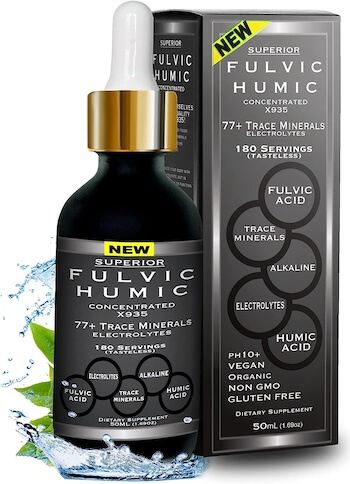Fulvic acid. The term may sound familiar as if the description is hiding in the back of your mind somewhere but you can’t quite find it. Most have heard of it before, yet the majority of people out there could not tell you what it is, where it comes from, and what it does for the body. Fulvic acid is categorized as a humic substance. Humic substances are defined as “major components of the natural organic matter (NOM) in soil and water as well as in geological organic deposits such as lake sediments, peats, brown coals and shales,” by humicsubstance.org.
It is one of the building blocks of soil and is created during the process of organic matter decomposing. Its mission is to break down nutrients so that they are more assimilable for plants. Well, that benefit does not just stop with plants. Most of us could sure use a hand assimilating nutrients as well!
Food today is not what it once was. Commercially grown, genetically modified crops and the overuse of pesticides have taken a substantial toll on the health of the soil, and subsequently on our food. Even if someone is eating a well-rounded, balanced diet, they may not be receiving all of the vitamins and minerals that they need solely because the produce they are consuming was grown in sub-par soil. Our ancestors likely pulled a vegetable from the ground, quickly wiped it off, and then ate it. From an evolutionary perspective, a person’s diet used to contain a lot more soil, and with that healthy soil came friendly bacteria and healthy compounds such as fulvic acid. Readily available produce has not provided adequate levels of fulvic acid for a long time.
An increase in fulvic acid consumption, usually through supplementation, helps to restore nutrient stores that are often severely depleted. Fulvic acid contains beneficial components such as vitamins, minerals, hormones, fatty acids, flavonoids, and ketones.

BENEFITS OF FULVIC ACID
• Supports neurological health. Fulvic acid is a potent electrolyte and works to restore cellular health. A study performed at the University of Chile’s International Center for Biomedicine demonstrated that Fulvic acid contains compounds that may protect against neurological debilitation.
• Improves the enzymatic reactions in cells, which promotes cellular health and assists with the formation of new enzymes.
• Contributes to the removal of toxins from the body in a variety of ways. It has been often shown to increase the capacity of the cells to release harmful, toxic metals such as aluminum. Fulvic acid also promotes balanced hydration, which improves the passing of toxic substances.
• Increases Nutrient Absorption due to its ability to break down nutrients into a more biochemically available form. This is especially important for difficult-to-assimilate minerals. It has been shown to increase the lifespan of essential nutrients and to increase the nutrient’s ability to penetrate cellular walls.
ADDITIONAL REPORTED BENEFITS:
• Increases the effect of other nutrient supplements
• Supports the immune system
• Lowers blood pressure
• Aids in healing burns
• Soothes and treats rashes and other skin irritations

WHERE TO FIND FULVIC ACID
So, if there are inadequate levels of fulvic acid in the product that is out there, how can you increase your intake? If you are a gardener, you can add a fulvic acid nutrient blend to your soil to increase the amount that you consume via your food. If you are looking for a supplement to add to your daily regimen, there are a few options out there==> The products on the market include a variety of tinctures, tonics, and capsules containing a blend of soil-based organisms (SBOs), and trace mineral blends that contain fulvic acid.
REFERENCES:
Analytica Chimica Acts, Special Issue, Humic and Fulvic Compounds, 232 (1), 1-235. (Amsterdam, Netherlands: Elsevier Science Publishers).Cornejo A, Jiménez JM, Caballero L, Melo F, Maccioni RB. Fulvic acid inhibits aggregation and promotes disassembly of tau fibrils associated with Alzheimer’s disease. J Alzheimers Dis. 2011;27(1):143-53. doi: 10.3233/JAD-2011-110623.
Carlos Carrasco-Gallardo, Leonardo Guzmán, and Ricardo B. Maccioni Shilajit: A Natural Phytocomplex with Potential Procognitive Activity. Int J Alzheimers Dis. 2012; 2012: 674142.
Strathmann TJ, Myneni SC. Effect of soil fulvic acid on nickel(II) sorption and bonding at the aqueous-boehmite (gamma-AIOOH) interface. Environ Sci Technol. 2005 Jun 1;39(11):4027-34.
Oxidation reduction – Senesi, N., Chen, Y., & Schnitzer, M. (1977b). The role of humic acids in extracellular electron transport and chemical determination of pH in natural waters. Soil Biology and Biochemistry, 9, 397-403.
YOU MAY ALSO LIKE:
HEART AND BRAIN SCIENCE TO MAKE NEW YEAR’S RESOLUTIONS FUN AND SUCCESSFUL
“The secret of change is to focus all of your energy, not on fighting the old, but on building the new.” …
SULFITES IN WINE – THE MYTHS THAT EVERYONE BELIEVES
Even if you don’t particularly enjoy drinking wine, you probably think you know all about the sulfites in wine. We’ve heard…
6 HOLISTIC WAYS TO RELAX
By Tess DiNapoli Relaxation plays a vital function in dampening stress levels and helping us restore our mental and physical wellbeing….
YOGA AND CONSCIOUS BREATHING FOR ANTI-AGING
By Esse Johnson I believe that a primary reason for getting older and wiser has become such a physically painful ordeal…
THE LOWDOWN ON FATIGUE: SOME THINGS THAT MAY SURPRISE YOU (PART 1)
Most of us have experienced periods of fatigue: of feeling listless, tired, and low-energy, in a way that affects both our…
RAW VEGAN AVOCADO CHOCOLATE MOUSSE CAKE
This decadent, raw, vegan cake is sure to please anyone. It’s raw, organic, and gluten-free! All the ingredients are excellent sources…








